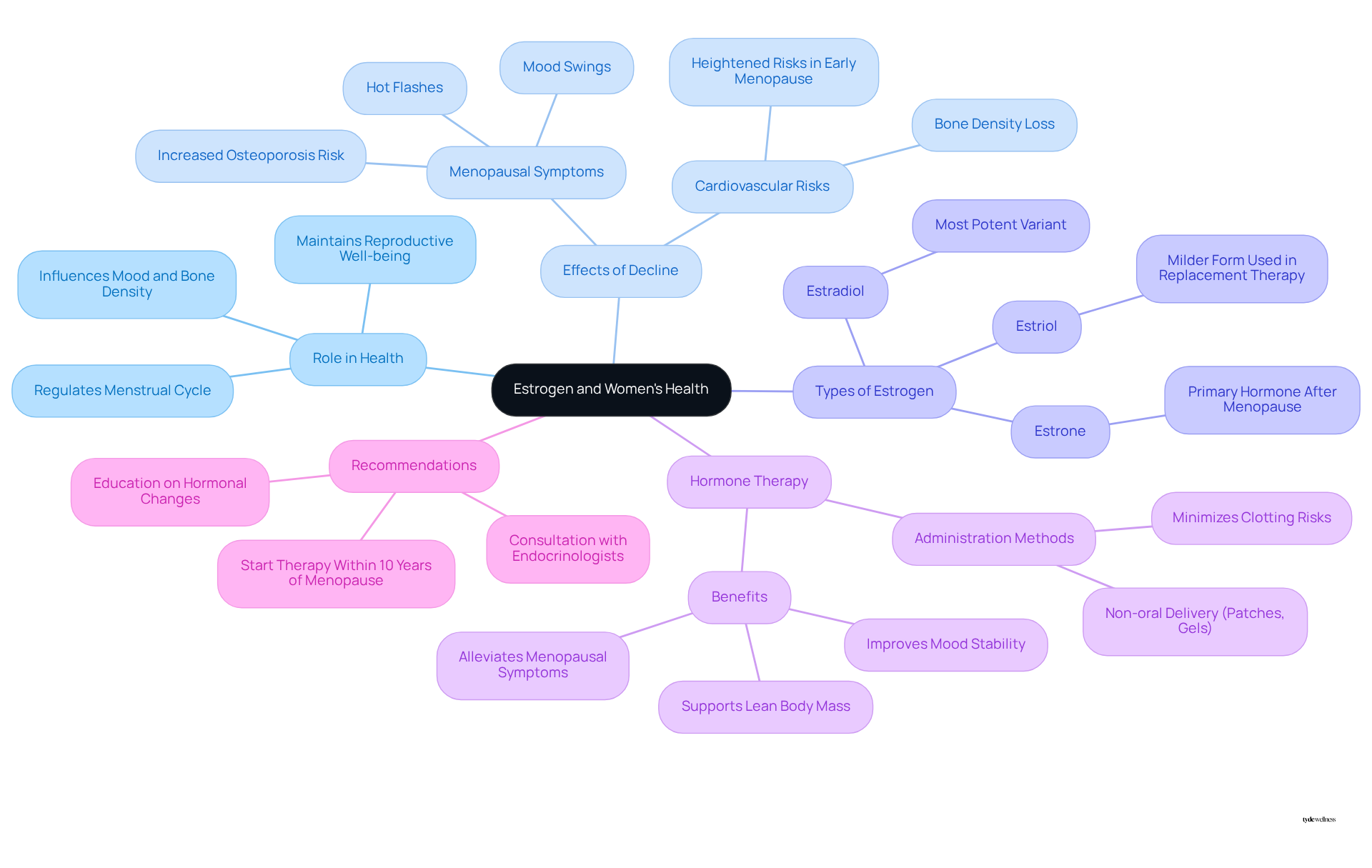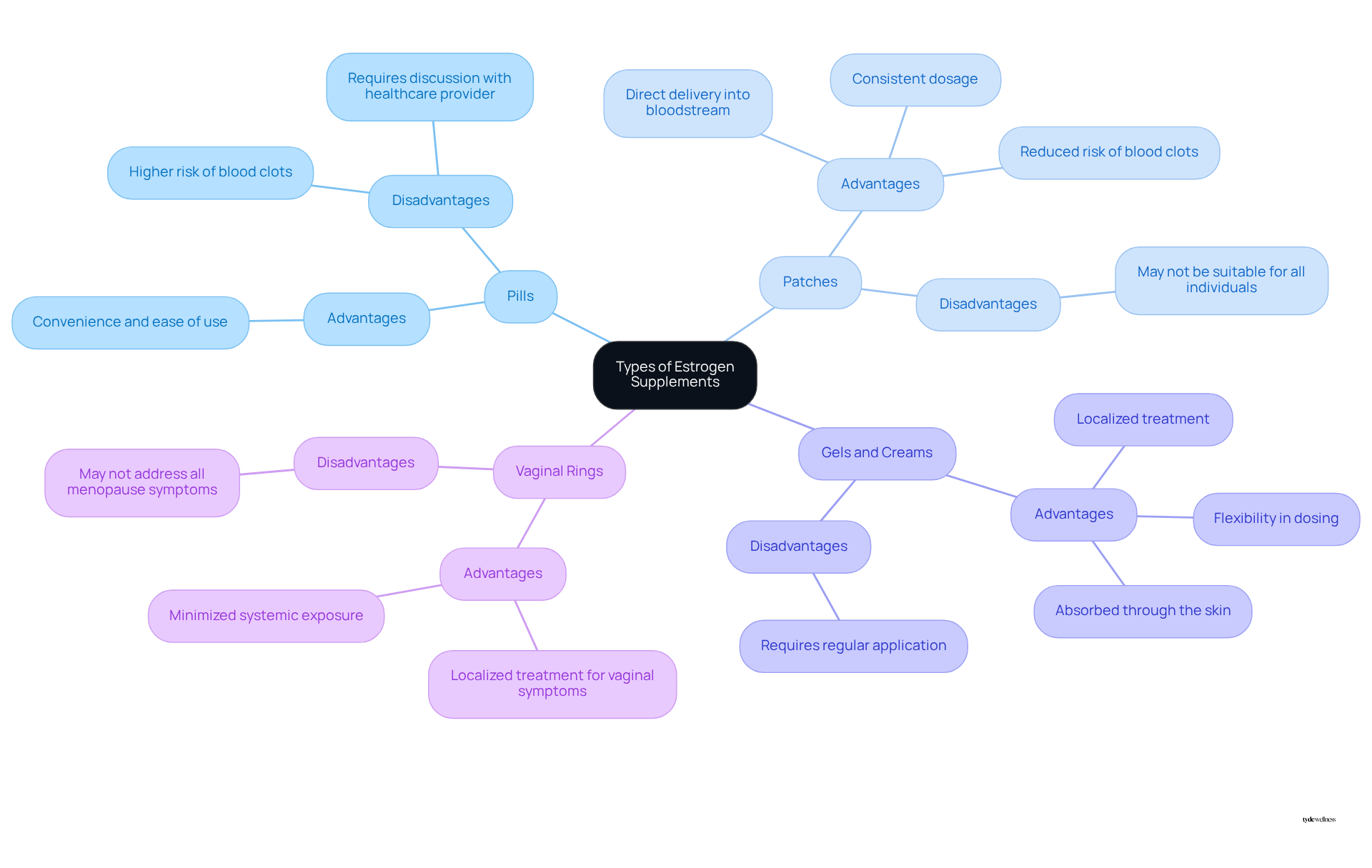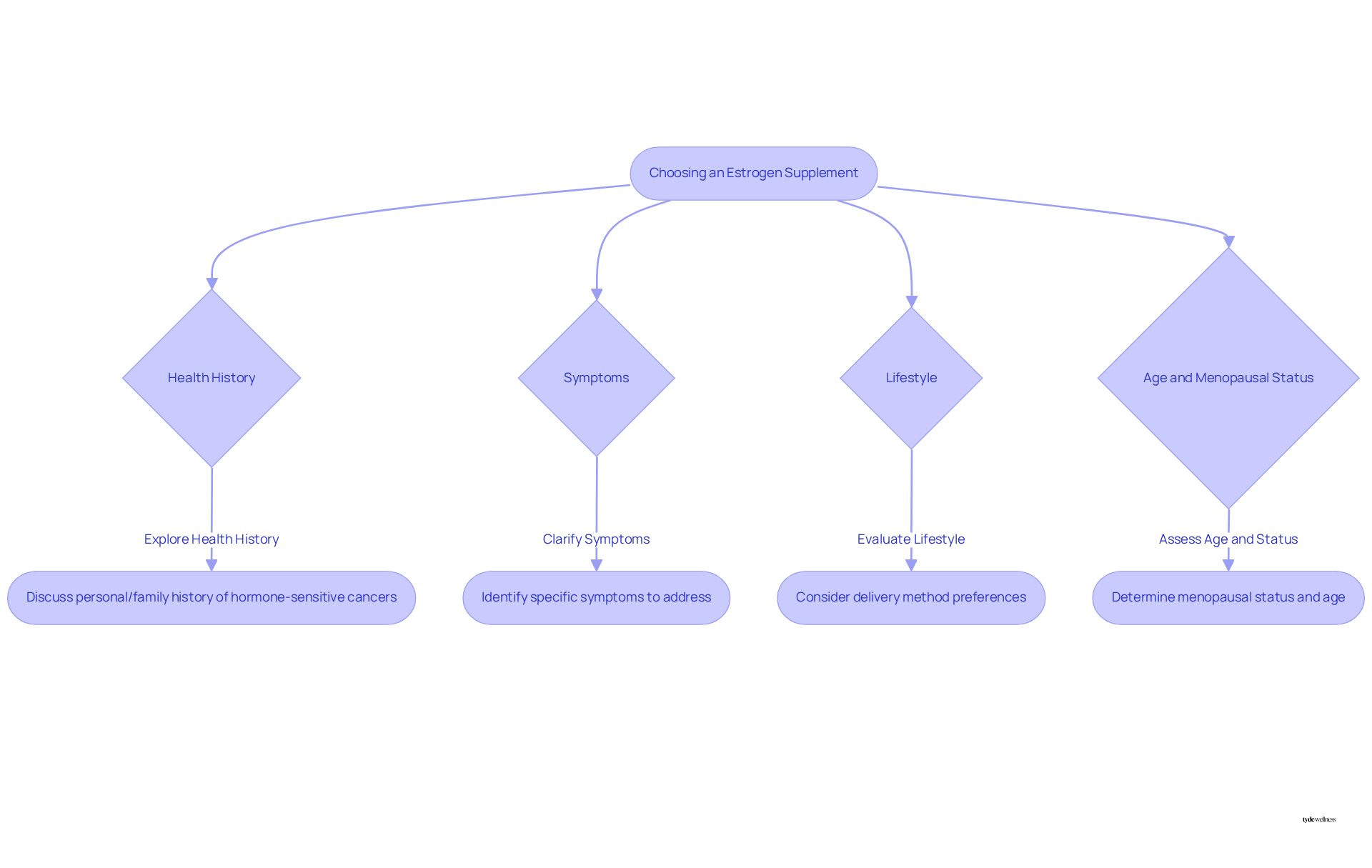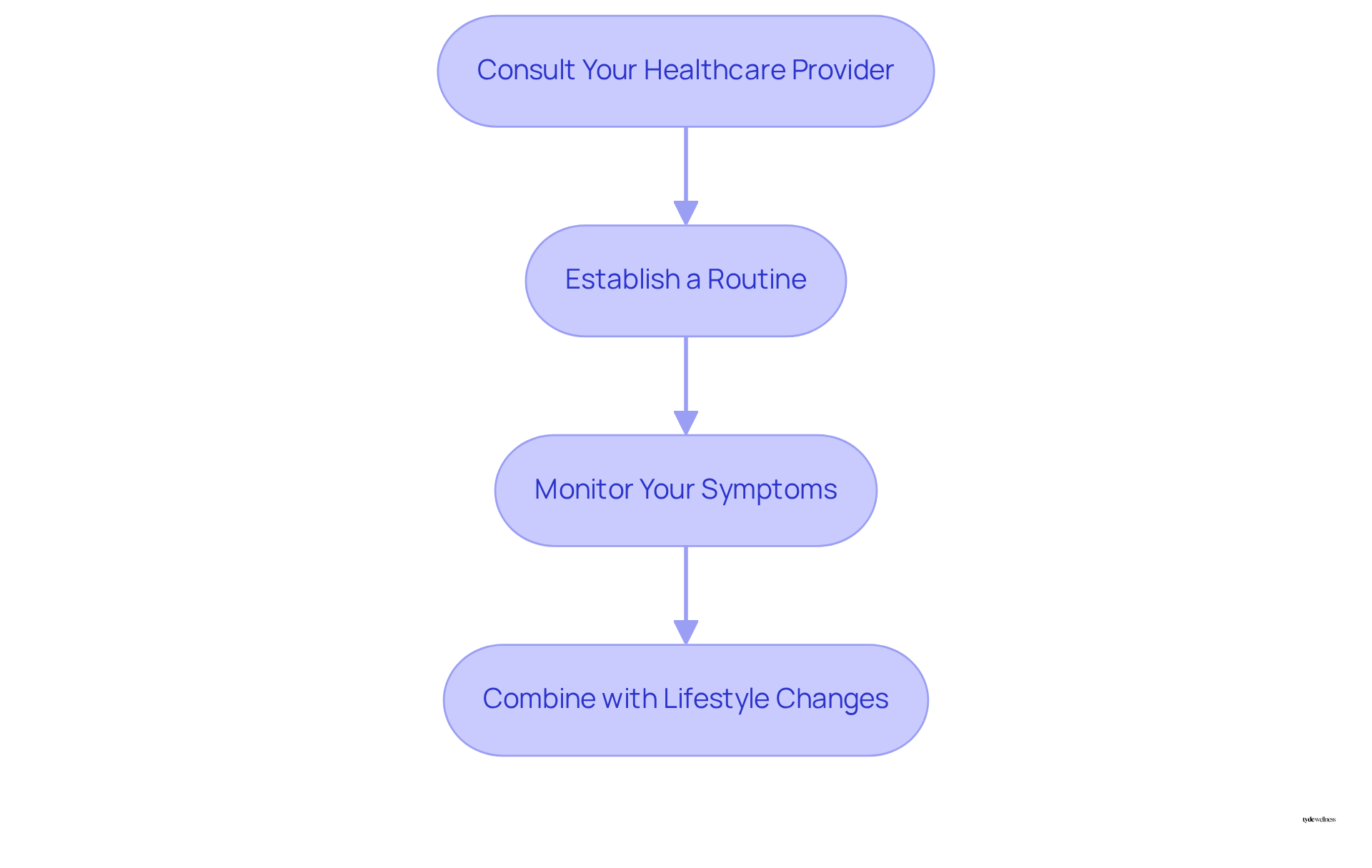Overview
Selecting the appropriate estrogen supplement for women requires careful consideration of several factors, including:
- Health history
- Specific symptoms
- Lifestyle preferences
- Menopausal status
This article outlines these critical considerations, highlighting the necessity of consulting healthcare providers. Additionally, it emphasizes the importance of understanding the various forms of estrogen supplements available. Such knowledge can help tailor the choice to meet individual health needs and enhance overall well-being during menopause.
Introduction
Understanding the intricate role of estrogen in women’s health is essential, particularly as many face the challenges of menopause. With over a billion women projected to experience menopause by 2030, the significance of estrogen supplementation becomes increasingly clear. This guide explores the critical steps for selecting the right estrogen supplement, providing insights that empower women to navigate their health choices effectively. However, with a variety of options available, how can one determine the most suitable supplement amidst the complexities of hormonal changes and individual health needs?
Understand Estrogen and Its Role in Women’s Health
Estrogen, a crucial hormone in female health, is often supported by an estrogen supplement for women, which is responsible for regulating the menstrual cycle, maintaining reproductive well-being, and influencing mood and bone density. As females approach menopause, hormone levels decrease significantly, which can lead to various symptoms such as hot flashes, mood swings, and an increased risk of osteoporosis. Research indicates that over a billion individuals will experience menopause worldwide by 2030, underscoring the importance of understanding these hormonal changes.
The decline in estrogen levels during menopause is linked to various health risks. For instance, studies show that females who undergo early menopause may face heightened cardiovascular risks and bone density loss. Hormone therapy (HT), particularly the estrogen supplement for women, has been proven to effectively alleviate menopausal symptoms, with many women reporting relief from hot flashes and improved mood stability within three to four weeks of initiating treatment. Additionally, endocrine treatment has a small but measurable effect on lean body mass, further supporting its benefits.
Estrogen exists in different forms—estradiol, estrone, and estriol—each playing unique roles in the body. Estradiol is the most potent variant and is essential for reproductive health, while estrone is the primary hormone type after menopause. Estriol, often considered a milder form, is commonly used in replacement therapy. Understanding these differences is vital for selecting the appropriate estrogen supplement for women that is tailored to individual health needs.
Endocrinologists emphasize the importance of starting therapy within ten years of menopause onset to maximize benefits and minimize risks. Current guidelines recommend non-oral delivery of female hormones, such as through patches or gels, to lower the risk of blood clots and cardiovascular issues, making it a safer option for many individuals. A study on hormone therapy and cardiovascular conditions in menopausal women indicates that estrogen-based hormone therapy can improve cardiovascular biomarkers, further supporting its use. This foundational understanding will empower you to make informed choices regarding hormone supplementation, particularly concerning the estrogen supplement for women and its impact on enhancing your overall well-being during menopause.

Explore Different Types of Estrogen Supplements
Estrogen supplement for women is available in several forms, each offering distinct advantages and disadvantages tailored to various health needs and lifestyles.
-
Pills: Oral estrogen is widely prescribed due to its convenience and ease of use. However, it carries a higher risk of blood clots compared to other delivery methods, which is an important consideration for many individuals. According to recent studies, the risk of blood clots can be significantly higher with oral forms, making it essential for individuals to discuss their personal health profiles with their healthcare providers.
-
Patches: Transdermal patches provide a direct delivery of estrogen into the bloodstream, significantly reducing the risk of blood clots and ensuring a consistent dosage. This method is often favored for its steady release and ease of application. Real-world examples indicate that individuals using patches report fewer side effects related to blood clotting compared to those on pills. In 2025, patches are gaining popularity, with market data showing an increase in their adoption due to these benefits.
-
Gels and Creams: These topical options allow for localized treatment, particularly beneficial for individuals experiencing specific symptoms. They offer flexibility in dosing and can be absorbed through the skin, making them a versatile choice. Experts suggest these forms for individuals who prefer targeted relief without systemic effects.
-
Vaginal Rings: Designed for localized estrogen treatment, vaginal rings effectively address vaginal symptoms while minimizing systemic exposure. This approach is especially beneficial for individuals seeking relief from dryness or discomfort without impacting overall bodily levels. Gynecologists often highlight the effectiveness of vaginal rings as an estrogen supplement for women who experience localized symptoms without the risks associated with systemic hormone therapy.
In 2025, the market for hormone supplements continues to evolve, with patches gaining popularity due to their effectiveness and lower risk profile. Understanding these choices, along with professional perspectives and current market trends, will enable you to select the most appropriate type of hormone supplement that aligns with your wellness needs and lifestyle.

Identify Key Factors for Choosing the Right Estrogen Supplement
When selecting an estrogen supplement for women, several key factors should be carefully considered.
-
Health History: It is crucial to discuss any personal or family history of hormone-sensitive cancers, cardiovascular issues, or blood clotting disorders with your healthcare provider. Recent studies indicate that women with a history of breast cancer who undergo therapy have a 40% reduced risk of dying from the disease, highlighting the importance of customized recommendations based on individual health backgrounds.
-
Symptoms: Clearly identify the specific symptoms you wish to address, such as hot flashes, mood swings, or vaginal dryness. This clarity will assist your healthcare provider in deciding the most suitable type and dosage of hormone therapy. For instance, severe menopause symptoms often indicate a strong candidacy for hormone replacement therapy.
-
Lifestyle: Consider your daily routine and preferences when selecting a delivery method for the hormone. If a non-daily regimen suits you better, options like patches or vaginal rings may be more suitable, as they can lower the risk of blood clots in comparison to oral hormones. Transdermal hormone delivery methods, such as patches and gels, are particularly noted for their safety profile.
-
Age and Menopausal Status: Your age and whether you are perimenopausal or postmenopausal significantly influence the type of hormone therapy recommended. Women starting hormone therapy between ages 50 and 60 experience a 33% decreased risk of fractures, underscoring the benefits of timely intervention.
By considering these factors, you can make a more informed choice about which estrogen supplement for women aligns with your wellness objectives, ensuring a tailored approach to managing menopause symptoms.

Integrate Estrogen Supplements into Your Health Regimen
To effectively integrate estrogen supplements into your health regimen, consider the following steps:
-
Consult Your Healthcare Provider: Prior to starting any supplement, it is crucial to discuss your options with a healthcare professional. This ensures that the selected supplement is safe and suitable for your specific health requirements, particularly given the complexities associated with hormone therapy. As Dr. Marty Makary notes, systemic hormone therapy, when initiated within 10 years of menopause, can actually reduce cardiovascular disease risk.
-
Establish a Routine: Consistency is key when taking supplements. Select a specific time each day to take your estrogen supplement for women, whether it’s in the form of a pill, patch, or gel. This routine aids in strengthening compliance, which is essential for attaining the desired wellness results. Historical data shows that 15 million women in the U.S. were taking an estrogen-based menopausal treatment in the 1990s, underscoring the importance of establishing a reliable regimen.
-
Monitor Your Symptoms: Keeping a thorough log of any changes in your symptoms and overall well-being is crucial. This practice enables you and your healthcare provider to evaluate the effectiveness of the supplement and make necessary adjustments. Research suggests that regular monitoring can significantly improve treatment outcomes, making it a vital part of your wellness strategy.
-
Combine with Lifestyle Changes: To maximize the benefits of estrogen supplementation, incorporate lifestyle modifications such as a balanced diet, regular physical activity, and effective stress management techniques. These factors can profoundly affect hormone levels and overall wellness, contributing to a more holistic approach to well-being during menopause. For instance, women who adopt these lifestyle changes alongside their supplementation often report an improved quality of life.
By following these steps, you can successfully incorporate an estrogen supplement for women into your health regimen, potentially leading to an enhanced quality of life during menopause.

Conclusion
Understanding the nuances of estrogen supplementation is essential for women navigating the often-challenging transition of menopause. This guide outlines the critical role estrogen plays in women’s health, particularly during menopause, and the various types of supplements available to alleviate symptoms and improve quality of life. By recognizing the importance of tailored approaches, women can make informed choices that align with their unique health profiles and lifestyle preferences.
Key arguments presented include:
- The significance of consulting healthcare providers to evaluate personal health histories, symptoms, and lifestyle considerations when selecting the right estrogen supplement.
- The exploration of different forms of estrogen, from pills to patches and gels, highlights the need for individualized solutions that prioritize safety and efficacy.
- Integrating estrogen supplements into a broader health regimen, including lifestyle changes, can enhance the overall impact on well-being.
Ultimately, the journey through menopause does not have to be daunting. By empowering themselves with knowledge and taking proactive steps, women can effectively manage their symptoms and embrace this new phase of life. Prioritizing estrogen health is not just about alleviating discomfort; it is a vital component of maintaining overall health and vitality.
Frequently Asked Questions
What is the role of estrogen in women’s health?
Estrogen is a crucial hormone that regulates the menstrual cycle, maintains reproductive well-being, and influences mood and bone density in women.
How does menopause affect estrogen levels?
As women approach menopause, estrogen levels decrease significantly, leading to symptoms such as hot flashes, mood swings, and an increased risk of osteoporosis.
What are the health risks associated with declining estrogen levels during menopause?
The decline in estrogen levels during menopause is linked to heightened cardiovascular risks and bone density loss, particularly for those who experience early menopause.
How can hormone therapy help with menopausal symptoms?
Hormone therapy, especially estrogen supplements, has been shown to alleviate menopausal symptoms such as hot flashes and mood instability, with many women experiencing relief within three to four weeks of starting treatment.
What are the different forms of estrogen and their roles?
The three forms of estrogen are estradiol (the most potent and essential for reproductive health), estrone (the primary hormone type after menopause), and estriol (a milder form often used in replacement therapy).
When is the best time to start hormone therapy?
It is recommended to start hormone therapy within ten years of menopause onset to maximize benefits and minimize risks.
What are the current guidelines for hormone delivery methods?
Current guidelines recommend non-oral delivery methods, such as patches or gels, to lower the risk of blood clots and cardiovascular issues, making it a safer option for many individuals.
How does estrogen-based hormone therapy impact cardiovascular health?
Studies indicate that estrogen-based hormone therapy can improve cardiovascular biomarkers in menopausal women, supporting its use in managing health during this stage.
List of Sources
- Understand Estrogen and Its Role in Women’s Health
- Menopause Hormone Therapy is Making a Comeback: Is it Safe and Right for You? | (https://longevity.stanford.edu/lifestyle/2025/03/06/menopause-hormone-therapy-is-making-a-comeback-is-it-safe-and-right-for-you)
- After Decades of Misunderstanding, Menopause is Finally Having Its Moment (https://medicine.yale.edu/news-article/after-decades-of-misunderstanding-menopause-is-finally-having-its-moment)
- Estrogen therapy linked to improved heart health (https://contemporaryobgyn.net/view/estrogen-therapy-linked-to-improved-heart-health)
- Can hormone therapy improve heart health in menopausal women? (https://pennstatehealthnews.org/2025/04/can-hormone-therapy-improve-heart-health-in-menopausal-women)
- Scientists uncover the link between estrogen and heart health in women (https://monash.edu/news/articles/scientists-uncover-the-link-between-estrogen-and-heart-health-in-women)
- Explore Different Types of Estrogen Supplements
- Hormones for menopause are safe, study finds. Here’s what changed (https://npr.org/sections/health-shots/2024/05/01/1248525256/hormones-menopause-hormone-therapy-hot-flashes)
- Pills, Patches, Creams or Sprays? How to Choose a Hormone Therapy Delivery Mode (https://news.cuanschutz.edu/news-stories/youve-decided-to-try-hormone-therapy.-now-how-would-you-like-that-delivered)
- U.S. FDA may nix black box warning on some menopause estrogen treatments (https://sciencenews.org/article/fda-warning-menopause-estrogen)
- FDA Panel Wants to Nix Black Box Warning on Menopause Estrogen Therapy (https://everydayhealth.com/womens-health/fda-panel-recommends-removing-warnings-from-estrogen-therapies-for-menopause)
- Considering hormone replacement therapy or DHEA? Here’s what you need to know (https://nortonhealthcare.com/news/hormone-replacement-therapy-and-dhea)
- Identify Key Factors for Choosing the Right Estrogen Supplement
- Hormones for menopause are safe, study finds. Here’s what changed (https://npr.org/sections/health-shots/2024/05/01/1248525256/hormones-menopause-hormone-therapy-hot-flashes)
- Doctors urge FDA to remove black box warning on hormone therapy for menopause (https://npr.org/sections/shots-health-news/2025/07/25/nx-s1-5477644/menopause-hormone-therapy-fda-health)
- Hormone replacement safe and effective menopause treatment, study finds (https://pbs.org/newshour/show/hormone-replacement-safe-and-effective-menopause-treatment-study-finds)
- Integrate Estrogen Supplements into Your Health Regimen
- Hormones for menopause are safe, study finds. Here’s what changed (https://npr.org/sections/health-shots/2024/05/01/1248525256/hormones-menopause-hormone-therapy-hot-flashes)
- Menopause Topics: Hormone Therapy | The Menopause Society (https://menopause.org/patient-education/menopause-topics/hormone-therapy)
- Black box warning on menopause hormone therapies should be removed, experts say | CNN (https://cnn.com/2025/07/24/health/menopause-hormone-treatment-wellness)
- After Decades of Misunderstanding, Menopause is Finally Having Its Moment (https://medicine.yale.edu/news-article/after-decades-of-misunderstanding-menopause-is-finally-having-its-moment)



